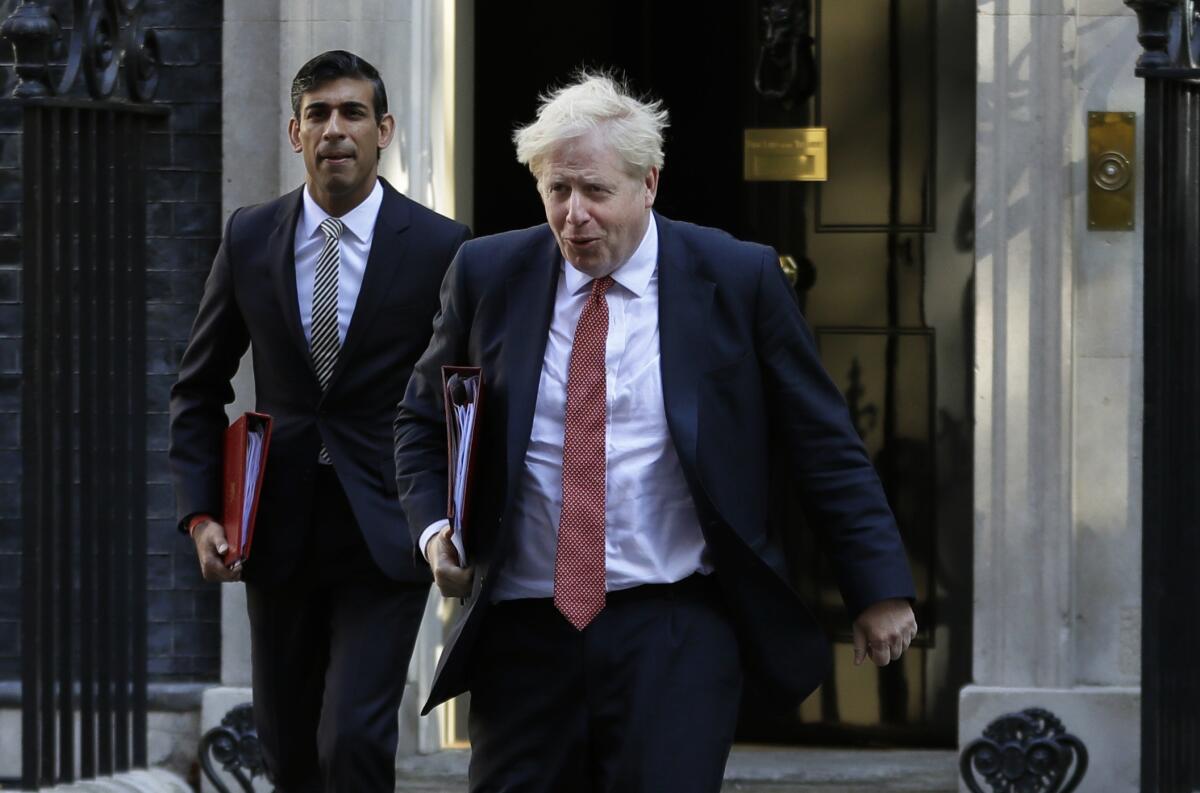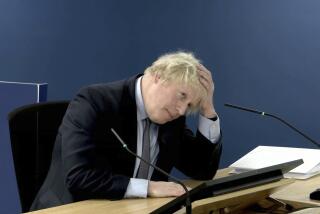In U-turn, U.K.’s Johnson to quarantine after COVID-19 contact

- Share via
LONDON — British Prime Minister Boris Johnson will spend 10 days self-isolating after contact with a confirmed coronavirus case, his office said Sunday — reversing an earlier announcement that he would not have to quarantine after facing an uproar.
Johnson’s 10 Downing St. office said the prime minister and Treasury chief Rishi Sunak were both alerted overnight by England’s test-and-trace phone app. Both had met recently with Health Secretary Sajid Javid, who tested positive for the virus on Saturday. Javid, who has been fully vaccinated, says he is experiencing mild symptoms.
People who are notified through the app are supposed to self-isolate for 10 days, though it is not a legal requirement.
But Johnson’s office initially said the prime minister and Sunak would instead take daily coronavirus tests as part of an alternative system being piloted in some workplaces, including government offices.
That plan was reversed less than three hours later after an outcry over apparent special treatment for politicians. Downing Street said Johnson would self-isolate at Chequers, the prime minister’s country residence, and “will not be taking part in the testing pilot.” It also said Sunak would self-isolate.
In a video message, Johnson said he and Sunak had “briefly” considered taking part in the pilot scheme.
“But I think it is far more important that everyone sticks to the same rules, and that’s why I’m going to be self-isolating until Monday, July 26,” he said.
Keir Starmer, leader of the opposition Labor Party, likened Johnson’s Conservative government to bank robbers who “got caught and have now offered to give the money back.”
“Boris Johnson and Rishi Sunak have been busted yet again for thinking the rules that we are all following don’t apply to them,” he said. “The way the prime minister conducts himself creates chaos, makes for bad government and has deadly consequences for the British public.”
Britain is experiencing rising coronavirus cases due to the more infectious Delta variant, and is seeing a related “ping-demic” of hundreds of thousands of people being told to quarantine because they have been near someone who tested positive.
Whole classes have been sent home from schools. Hospitals are short of workers. Businesses including restaurants, car manufacturers and the London subway say they are facing staff shortages because of the self-isolation rules.
Many London theaters, which have only recently resumed performances as restrictions eased, have had to cancel performances because cast and crew members were told to quarantine. On Sunday, Kenneth Branagh’s theater company announced it was canceling the entire run of its show “The Browning Version” because of “an increasing number of COVID-enforced absences.”
The government says it will remove the requirement for people who have been fully vaccinated to self-isolate after contact with an infected person, but not until Aug. 16.
Johnson was seriously ill with COVID-19 in April 2020, spending three nights hospitalized in intensive care.
In a touch of irony, his spell in isolation comes as his government prepares to lift remaining lockdown measures Monday. Nightclubs can reopen in England for the first time since March 2020, sports and entertainment venues can admit capacity crowds and face masks are no longer mandatory indoors. Thousands of people were planning to go clubbing once the clock struck midnight Sunday.
But the government is urging people to be cautious, as cases surge because of the Delta variant, first identified in India. More than 54,000 new infections were confirmed Saturday, the highest daily total since January. COVID-19 hospitalizations and deaths are also rising, but remain far lower than at previous infection peaks thanks to widespread vaccination. More than 87% of British adults have had one vaccine shot and 68% have had both shots.
Still, British officials are looking nervously at Israel and the Netherlands, both of which opened up widely after vaccinating most of their people but had to reimpose some restrictions after new infection surges. The Dutch prime minister admitted that opening up too early “was a mistake.”
More to Read
Sign up for Essential California
The most important California stories and recommendations in your inbox every morning.
You may occasionally receive promotional content from the Los Angeles Times.










